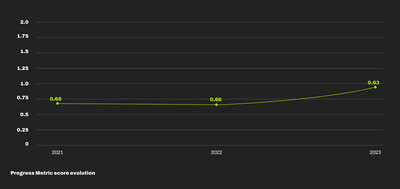Liip is a purpose driven company. We create long-lasting social, environmental and economic value, by striving for digital, human progress. With our purpose, the motivation to contribute to the three sustainability dimensions has always been at the core of what we do.
Nevertheless, doing business and how we live is still damaging our planet. Our ongoing mission is to reduce the harm we cause and increase our positive impact. We work on it in different ways. Based on our profile as a service provider, we divide our measures into 3 pillars: How we work as a company, how we build digital products and how the products impact people and the planet.
1. Company impacts: How we work
As for many companies, one focus is our internal footprint, improving our environmental, social and economic impact as an organization. What we are and have been doing to increase our positive impacts, and reduce the negative ones as well. Company impacts cover the environment, social and economic aspects and all 17 of the UN’s Sustainability Development Goals. This includes CO2 emissions, energy, heating, mobility, waste, hardware, work-life balance, diversity, equality, education, employee health, access to shares or sustainable pension fund. This is about HOW we work together.




Sustainability is a continuous journey. We continue on improving on this, as all companies, institutions and individuals should do because there is always more to be done. But as a service provider, this is not where our impact is the most important.
Want to know where we stand?
Read our sustainability report.
2. Products footprint: How we build digital products
The second area of activities is also focusing on HOW we work, but more specifically on our work as a digital agency. As much as digital solutions can improve sustainability, the negative environmental impact of the digital world cannot be overlooked. As digital experts, it is our duty to improve on this.
For years, we have developed digital solutions, websites, apps that are technically performant (meaning less energy consumption to use them), accessible and relying on green hosting. Here again, this is good, but not good enough. And to improve on this, it is important to have a clear and thorough assessment tool.
We are now actively working with the W3C Web Sustainability Guidelines, demonstrating how to design and implement digital services and products with the planet in mind. These new guidelines offer a complete overview of digital sustainability, from hosting, to development, design, accessibility, content, and data privacy. We are also part of the community group further developing the guidelines. We are assessing our products based on the W3C guidelines. And we are upskilling through internal training of our production teams.
3. Positive products: What we work on
Improving HOW we work is crucial. But if we offer a digital product with a good footprint, later used in an extractive and unsustainable business, our overall impact will still be negative. The WHAT we work on, and WHO we work for, are therefore as essential. This topic is not new to us, as we have included an ethics check in our client selection process for years.
But we wanted a more systematic data-driven approach and developed the Progress Metric. It is a sustainability evaluation methodology and platform based on the UN’s SDGs.
This Progress Metric helps us assess the sustainability of our client and project portfolio. It helps us focus and evaluate our own activities, as much as our financial data do. Thanks to it, we measure and we improve. Not only do we want to improve the sustainability of our project portfolio, we also target and work on a portfolio shift. This is a global and long-lasting effort, supported by our business development teams. We initiated expert groups on the topics of mobility, energy, and biodiversity.

We can help you get there.
Read more about our responsible digital services
From awareness to action
The transformation has to take place in all 3 areas in parallel. The key ingredient for this to happen is employee engagement – or how we would say: Liipers’ engagement. To achieve this, we introduced different initiatives around sustainability.
We offer different internal trainings that help Liipers deepen their sustainability knowledge. One example is The Week, a training offering a deep dive into the environmental crises, identifying what trigger changes and what we can do at our level. We organise Sustainability Lunches, for which we invite guest speakers from other purpose-driven organisations our colleagues would like to meet. So we can learn from them. Or, we developed the Liipers’ Fund: We pay into the fund on a monthly basis. It enables Liipers to realise projects with clients or partners who otherwise would not be able to afford our work.
These are just some examples of our current list, that gets continuously expanded. We want sustainability to be distributed over as many heads and hearts as possible – and with this, solidly anchored in our governance.
We over me
Recognizing that the journey toward greater sustainability can only be achieved together, we have joined the B Corp movement—a global community of nearly 9,000 companies (including over 130 in Switzerland) dedicated to creating a positive impact on society and the environment. We firmly believe that the true measure of a company's success goes beyond financial results, embracing both social and environmental impact.
Find out more about our commitment to B Corp values